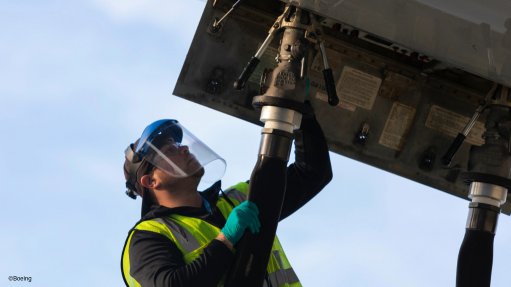Force Majeure Claims in terms of Standard Form Construction Contracts
This article has been supplied as a media statement and is not written by Creamer Media. It may be available only for a limited time on this website.
Authored by Fasken partner Jesicca Rajpal, partner Bianca Da Costa, associate Muhammed Moti & candidate attorney Lucrecia Sadhaseevan
Introduction
1. On 24 May 2020, President Cyril Ramaphosa announced the implementation of alert level 3 of the national state of disaster with effect from 1 June 2020. In terms of this level, the construction industry will be fully operational subject to strict health protocols and social distancing rules.
2. The reactivation of work on construction sites, however, will not eradicate the negative effects of the pandemic including the 5 week national lockdown on the industry. Potential litigation based on force majeure claims is likely to arise due to circumstances such as ‘the immediate stoppage of work, lack of payment for certified work, the impossibility to complete work, loss of income and manpower to mention but a few’.
3. This article considers force majeure clauses in standard form construction contracts and will provide guidance on the relief contractors may rely on when delivering force majeure claims during a pandemic.
Is a pandemic considered a force majeure event within standard form construction contracts?
4. The 4 main types of standard form construction contracts that are widely used in the South African construction industry are:
4.1 The General Conditions of Contract for Construction Works ("GCC");
4.2 The International Federation of Consulting Engineers suite of construction contracts (the "FIDIC Contracts ");
4.3 The JBCC Principal Building Agreement ("PBA") or Minor Works Agreement ("MWA") ("collectively referred to as the JBCC"); and
4.4 The New Engineering Contract Family of Contracts ("NEC4").
5. On 11 March 2020, the World Health Organisation ("WHO") declared COVID-19 a global pandemic. Delays caused as a result of a pandemic are not expressly defined as a force majeure event in most standard form construction contracts. Instead, most standard form construction contracts include an ‘epidemic’ as a force majeure event. The WHO defines an epidemic as:
“The occurrence in a community or region of cases of an illness, specific health-related behaviour, or other health-related events clearly in excess of normal expectancy. The community or region and the period in which the cases occur are specified precisely. The number of cases indicating the presence of an epidemic varies according to the agent, size and type of population exposed, previous experience or lack of exposure to the disease, and time and place of occurrence.”
6. The WHO defines a pandemic as: “an epidemic occurring worldwide, or over a very wide area, crossing international boundaries and usually affecting a large number of people”. Thus, it can be widely interpreted that COVID-19 may be regarded an epidemic with a global impact and is arguably a force majeure event.
7. The clauses below illustrate the concept of force majeure in standard form construction contracts in light of an epidemic and/or pandemic:
The GCC
8. Sub-clause 8.3 refers to a force majeure event as an Excepted Risk which is defined as:
“risks of damage or physical loss or any other loss caused by or arising directly or indirectly as a result or consequences of:… Epidemic, famine or plague…”
The FIDIC Contracts
9. Clause 18 refers to a force majeure event as an Exceptional Event which is defined as:
“An event or circumstance which: (i) is beyond the Party’s control;(ii) the Party could not reasonably have provided against before entering into the Contract; (iii) having arisen, such Party could not reasonably have avoided or overcome; and (iv) is not substantially attributable to the other Party.”
10. Clause 18 further provides a non-exhaustive list of events which constitute an Exceptional Event provided that the requirements in (i)-(iv) above are met. Although the list does not include an epidemic as an Exceptional Event, it can be argued that an epidemic may be regarded as an Exceptional Event within the FIDIC Contracts for the following reasons:
10.1 it satisfies the requirements in (i)-(iv) above;
10.2 the list is a non-exhaustive list and the events specified are examples only; and
10.3 sub-clause 8.5 of the FIDIC Contracts provide five circumstances under which a contractor will be entitled to claim an extension of time if the completion of works is or will be delayed. One of the circumstances include an unforeseeable shortage in the availability of personnel or goods (or employer-supplied materials, if any) caused by an epidemic or governmental actions.
The JBCC
11. Sub-clause 1 defines force majeure as:
“An exceptional event or circumstance that could not have reasonably been foreseen, is beyond the control of the parties, and could not reasonably have been avoided or overcome.”
The NEC4
12. Sub clause 60.1 (19) refers to a force majeure event as a Compensation Event which is defined as:
“An event which: neither party could prevent; an experienced contractor would have judged at the Contract Date to have such a small chance of occurring that it would have been unforeseeable to have allowed for it; and is not one of the other Compensation Events stated in the contract.”
13. Although sub clause 1.1 of JBCC and sub clause 60.1 (19) of NEC4 do not expressly include an epidemic and/or pandemic as force majeure events, an epidemic and/or pandemic are events which are not reasonably foreseen, are beyond the control of the parties, and could not reasonably have been avoided or overcome before entering into the contract, unless the contract was entered into during the epidemic/and or pandemic.Therefore, it can be argued that an epidemic and/or pandemic may be regarded as force majeure events in terms of the JBCC and NEC4 standard form construction contracts.
What remedies are contractors entitled to when claiming force majeure as a result of an epidemic and/or pandemic in terms of standard form construction contracts?
14. Contractors may be entitled to termination (subject to certain conditions being met) or they can claim an extension of time ("EOT") for completion.
15. The general principle is that in order to acquire the right to terminate, the force majeure event must prevail for a certain continuous period of time. In circumstances where the force majeure event does not meet these requirements, the contractor will not be entitled to terminate the contract.
16. In most standard form construction contracts, an EOT can be claimed as soon as the contractor became aware or reasonably became aware of the force majeure event.
17. Some standard form construction contracts, however, are not as flexible. The NEC4 allows the contractor to claim an EOT once the project manager instructs the contractor on how to deal with the force majeure event and requests the contractor to submit a quotation comprising changes to the completion date. Thus, it is important that contractors whose projects are governed by the NEC4 notify the project manager of the force majeure event as soon as reasonably possible.
What is the procedure to be followed when claiming an EOT?
Notice
18. As indicated above, when claiming an EOT, written notice of the claim must be provided upon becoming aware or reasonably becoming aware of the force majeure event.
19. Each standard form construction contract makes provision for a notice period within which the contractor must comply. A contractor who fails to provide notice within these time limits may forfeit its right to an EOT, despite the fact that it may have suffered delay to its project as a result of force majeure event. In the standard GCC and FIDIC, if the force majeure event has a continuing effect, the contractor must give notice to the other party describing the effect every 28 days after giving the first notice and provide notice once the force majeure event ceases, until a final claim is made.
20. The claim for an EOT must be substantiated by records of the facts and circumstances which the contractor considers relevant. This includes among others details of all construction equipment, labour and materials relevant to the claim which will indicate that the force majeure event materially contributed to the shortage of labour, materials and equipment.
Approaches to consider going forward
21. As shown above, claiming force majeure based on an epidemic and/or pandemic in terms of standard form construction contracts can be a complex and stringent procedure. The force majeure provisions of some standard form construction contracts are also not clear-cut. Contractors whose projects have been delayed as a result of a force majeure event should:
21.1 ensure that the construction contract governing the project expressly provides for the occurrence of an epidemic and/or pandemic as a force majeure event, or the force majeure clause is a “catch-all” clause covering events which:
21.1.1 are beyond the party’s control;
21.1.2 the party could not reasonably have provided for before entering into the contract;
21.1.3 the party could not have avoided after it arose; and
21.1.4 is not caused by either of the parties.
21.2 consider the most reasonable relief available in the circumstances (weigh the risks and benefits of claiming an EOT over termination);
21.3 ensure that the time periods for providing notice of the force majeure claim are adhered to;
21.4 if the project is governed by the NEC4, contractors must adopt a proactive approach, instead of waiting for the project manager to provide an instruction on how to deal with the force majeure event;
21.5 ensure that detailed records on the facts and circumstances of the epidemic and/or pandemic are retained to strengthen the force majeure claim; and
21.6 exercise extra vigilance by updating records each time there is a change in the facts and circumstances of the epidemic and/or pandemic, which will materially affect the completion of the project.
Authors: Jesicca Rajpal, Bianca Da Costa, Muhammed Moti and Lucrecia Sadhaseevan- Fasken.
Comments
Press Office
Announcements
What's On
Subscribe to improve your user experience...
Option 1 (equivalent of R125 a month):
Receive a weekly copy of Creamer Media's Engineering News & Mining Weekly magazine
(print copy for those in South Africa and e-magazine for those outside of South Africa)
Receive daily email newsletters
Access to full search results
Access archive of magazine back copies
Access to Projects in Progress
Access to ONE Research Report of your choice in PDF format
Option 2 (equivalent of R375 a month):
All benefits from Option 1
PLUS
Access to Creamer Media's Research Channel Africa for ALL Research Reports, in PDF format, on various industrial and mining sectors
including Electricity; Water; Energy Transition; Hydrogen; Roads, Rail and Ports; Coal; Gold; Platinum; Battery Metals; etc.
Already a subscriber?
Forgotten your password?
Receive weekly copy of Creamer Media's Engineering News & Mining Weekly magazine (print copy for those in South Africa and e-magazine for those outside of South Africa)
➕
Recieve daily email newsletters
➕
Access to full search results
➕
Access archive of magazine back copies
➕
Access to Projects in Progress
➕
Access to ONE Research Report of your choice in PDF format
RESEARCH CHANNEL AFRICA
R4500 (equivalent of R375 a month)
SUBSCRIBEAll benefits from Option 1
➕
Access to Creamer Media's Research Channel Africa for ALL Research Reports on various industrial and mining sectors, in PDF format, including on:
Electricity
➕
Water
➕
Energy Transition
➕
Hydrogen
➕
Roads, Rail and Ports
➕
Coal
➕
Gold
➕
Platinum
➕
Battery Metals
➕
etc.
Receive all benefits from Option 1 or Option 2 delivered to numerous people at your company
➕
Multiple User names and Passwords for simultaneous log-ins
➕
Intranet integration access to all in your organisation


















